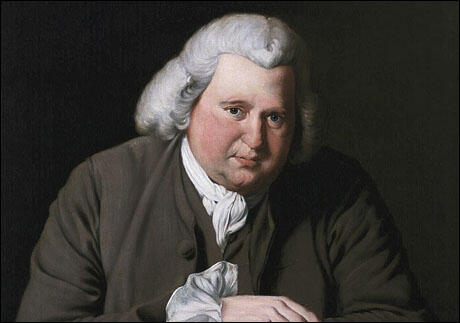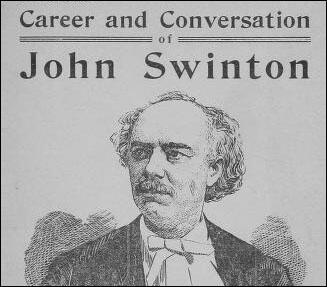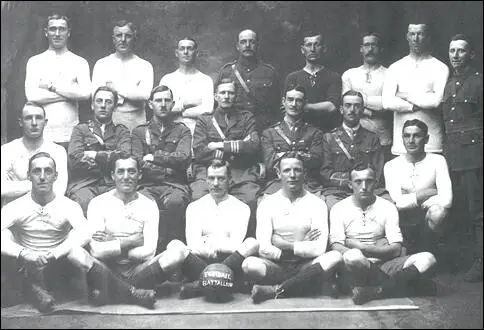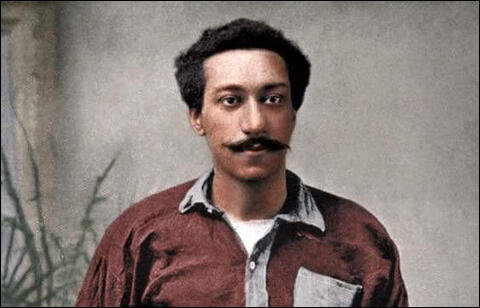On this day on 12th December
On this day in 1731 Erasmus Darwin was born. His father was a lawyer who came from a wealthy family. He was sent to the Chesterfield School in 1741 and in 1750 became a student at St John's College, where he studied classics and mathematics.
After leaving Cambridge University he studied medicine in Edinburgh which was, at that time, a major centre for medical education in Europe. Darwin established his first medical practice in Nottingham in 1756 but soon afterwards moved to Lichfield. The following year he married Mary Howard and over the next few years had three children, Charles, Erasmus and Robert.
Anna Seward met Darwin for the first time in 1757. "Dr. Darwin... was inclined to corpulence; his limbs too heavy for exact proportion... Florid health, and the earnest of good humour, a sunny smile, on entering a room, and on first accosting his friends, rendering, in his youth, that exterior agreeable, to which beauty and symmetry had not been propitious. He stammered extremely; but whatever he said, whether gravely or in jest, was always worth waiting for, though the inevitable impression it made might not always be pleasant to individual self-love". Another source commented on his "pock-marked face" and "stooping shoulders" that made him "look twice his age".
While living in Litchfield he became friends with Matthew Boulton, the owner of a company in Birmingham that employed 20,000 people. At his Soho Manufactory, considered to be Britain's very first factory made small metal goods such as "gold and silver toys produced trinkets, snuff-boxes, inkstands... and steel toys, chiefly buckles for both shoes and knee-breeches".
Jenny Uglow, the author of The Lunar Men (2002), suggested that "The chief bond between them was the love of invention and experiment. Very quickly they realized how they could complement each other. Darwin the university-educated theorist, Boulton the man with the technical know-how. equally outspoken, energetic and ebullient, they were two sides of a coin."
Erasmus Darwin was interested in natural philosophy and mechanical invention. In 1757 he published a paper where he provided details of an experiment that he carried out which proved that electricity did not affect the mechanical properties of air. A second paper, on his treatment of a patient who was spitting up blood, was published in Philosophical Transactions in 1760. The following year Darwin became a fellow of the Royal Society.
In 1768 Darwin and Boulton formed what became known as the Lunar Society of Birmingham. Other members included Josiah Wedgwood, Joseph Priestley, James Brindley, Thomas Day, William Small, John Whitehurst, John Robison, Joseph Black, William Withering, John Wilkinson, Richard Lovell Edgeworth and Joseph Wright. This group of scientists, writers and industrialists discussed philosophy, engineering and chemistry.
As Maureen McNeil has pointed out: "These innovating men of science and industry were drawn together by their interest in natural philosophy, technological and industrial development, and social change appropriate to these concerns. The society acquired its name because of the practice of meeting once a month on the afternoon of the Monday nearest the time of the full moon, but informal contacts among members were also important."
Boulton's factory used machines performing tasks such as turning lathes and stamping sheet metal. The engines of these machines were driven by a water mill, but the water source was always running dry, either from drought or diversion to the Birmingham Canal. Boulton and some of his friends at the Lunar Society had many discussions about the possibility of developing an engine powered by steam. (8) Darwin was especially involved in these experiments but he had to admit that he was unable to overcome the problems that Boulton faced.
James Watt, eventually came up with an effective steam-engine. Watt and Boulton formed a new company together. Roger Osborne, the author of Iron, Steam and Money: The Making of the Industrial Revolution (2013) has argued: "The two men instantly knew they could work together. Perhaps Watt saw that Boulton was the necessary complement to his own gloomy character - an energetic optimist who would carry him through his difficulties - while Boulton surely recognised the seriousness of Watt's character.... Watt was delighted not just by the prospect of investment hut especially by Boulton's personal enthusiasm."
Darwin continued his work as a doctor and scientist. He kept a book in which he recorded medical case notes, reflected on meteorology, and made mechanical designs of spinning machines, water pumps, and canal locks. "A keen inventor, among his many other mechanical contrivances were a new steering mechanism for carriages, a copying machine, and even a mechanical bird". He also developed a mechanical copying machine and sent the first duplicated letter to the politician Charles Greville.
Darwin had always written poetry and he formed a small literary circle in Lichfield. This included Anna Seward, Thomas Day, and Richard Lovell Edgeworth. Another reason for his poetry writing during this period was his love for Elizabeth Pole, who was not only beautiful but married, and therefore unobtainable. Darwin was almost thirty years older that Elizabeth who was in her late twenties. Elizabeth was described as having "agreeable features; the glow of health; a fascinating smile; a fine form, tall and graceful; playful sprightliness of manners; a benevolent heart and maternal affection."
The first volume of what Darwin described as his medico-philosophical work, Zoonomia: The Laws of Organic Life, appeared in 1794. Drawing on the work of his great friend, Joseph Priestley, the book offered a theory of biological learning which included both mind and body. "Opposed to notions of innate ideas, Darwin showed that ideas resulted from mental development through habits, often based on imitation. Hence he attributed the link between the wavy line and the sense of beauty, proposed by William Hogarth, to the infant's experience of the mother's breast. Darwin's contribution to associationist psychology was to sketch a sequential development of the faculties, through animal interaction with their environment, that fully integrated body and mind: from simple irritative responses to those of volition and association".
The second volume of Zoonomia: The Laws of Organic Life appeared in 1796. It included a catalogue of diseases, classified according to their proximate causes, together with details of substances for use in medical treatment. This included Priestley's recommendation that carbonated water would help people suffering from kidney stones. (10a) The book also included a chapter where he "formulated a theory of the development of life, free from the guiding hand of the Creator". It has been argued by his biographer, Desmond King-Hele, that "too old and hardened to fear a little abuse" he was no longer cowed by the wrath of his religious friends.
Darwin wrote: "Would it be too bold to imagine that in the great length of time since the earth began to exist, perhaps millions of ages before the commencement of the history of mankind, would it to be too bold to imagine that all warm-blooded animals have arisen from one living filament, which the great first cause endowed with animality, with the power of acquiring new parts, attended with new propensities, directed by irritations, sensations, volitions and associations; and thus possessing the faculty of continuing to improve by its own inherent activity; and of delivering down those improvements by generation to its posterity, world without end!"
Members of the Lunar Society were radical reformers. They supported freedom of the press, religious toleration, parliamentary reform and opposed the slave-trade. Darwin also welcomed the French Revolution. the challenging of the old order in France. Conservatives like Edmund Burke regarded their views as "insidious and foreign". In July 1791, Darwin's close friend, Joseph Priestley, had his house burnt down and his scientic equipment destroyed by anti-radical mob. Darwin was subjected to political attacks by George Canning and others in the conservative press. Other writers accused Darwin of holding "atheistic opinions". Erasmus Darwin died on 18th April 1802.

On this day in 1830 John Swinton, radical journalist, was born in Saltoun, Scotland. His family emigrated to Canada in 1843. Later they moved to Illinois. After leaving school he worked as a printer before finding employment on a steamboat on the Mississippi.
Swinton developed an abhorrence for slavery while living in Charleston, South Carolina. He moved to New York City in 1857 where he began the studying medicine. Swinton also worked as a freelance journalist and in 1860 he was appointed as head of the editorial staff of the New York Times by Henry J. Raymond. Swinton held liberal views and was a strong supporter of Abraham Lincoln and wrote extensively about the American Civil War. Swinton left the newspaper in 1870.
Swinton took a keen interest in the growing trade union movement and according to one source, over the next few years he "was busy as an orator and writer, championing the cause of the poor and oppressed". In 1874 he was selected by the Industrial Political Party to be the candidate for Mayor of New York City. Swinton received very few votes but he later claimed that it was part of a propaganda campaign rather than a serious attempt to win power.
In 1875 Swinton found work with the New York Sun. He continued to campaign for the rights of organized labour and in 1877 gave his support to the Brotherhood of Locomotive Fireman in their fight for better pay and conditions. In 1880 Swinton was invited to speak at a meeting of journalists in New York City about the freedom of the press. He outraged his colleagues by arguing: "There is no such thing, at this stage of the world’s history in America, as an independent press. You know it and I know it. There is not one of you who dare write your honest opinions, and if you did, you know beforehand that it would never appear in print. I am paid weekly for keeping my honest opinions out of the paper I am connected with. Others of you are paid similar salaries for similar things, and any of you who would be foolish as to write honest opinions would be out on the streets looking for another job. If I allowed my honest opinions to appear in one issue of my papers, before twenty-four hours my occupation would be gone. The business of the journalist is to destroy the truth, to lie outright, to pervert, to vilify, to fawn at the feet of mammon, and to sell his country and his race for his daily bread. You know it and I know it, and what folly is this toasting an independent press? We are the jumping jacks, they pull the strings and we dance. Our talents, our possibilities and our lives are all the property of other men. We are intellectual prostitutes."
In 1883 Swinton established his own newspaper, John Swinton's Paper. However, sales were poor and according to the New York Times: "This he conducted for four years hard struggle. It has given him an opportunity to spread his ideas on social and industrial questions. He had been on the side of the masses, but his paper died for want of support by them."
During the municipal campaign of 1887 he was the candidate of the Progressive Labor Party for Senator from the Seventh District. Although he was defeated he "polled a very heavy vote."
Swinton was a great supporter of Eugene Debs. In 1894 Swinton argued that as an orator, Debs was comparable to Abraham Lincoln: "It seemed to me that both men were imbued with the same spirit. Both seemed to me as men of judgment, reason, earnestness and power. Both seemed to me as men of free, high, genuine and generous manhood. I took to Lincoln in my early life, as I took to Debs a third of a century later."
In 1883 Swinton established his own newspaper, John Swinton's Paper. However, sales were poor and according to the New York Times: "This he conducted for four years hard struggle. It has given him an opportunity to spread his ideas on social and industrial questions. He had been on the side of the masses, but his paper died for want of support by them."
Swinton was the author of several pamphlets including New Issue: the Chinese American Question (1870), Eulogy on Henry J. Raymond (1870), John Swinton's Travels (1880) and an Oration on John Brown (1881).
John Swinton died on 15th December, 1901. In his obituary, the New York Times claimed: "He was never afraid to speak what he believed boldly and unreservedly... It was his boast that he never, no matter what the ideas of his employers were, wrote a line contrary to his honest convictions as uttered on the stump... As a man of original ideas and of freedom from the trammels of conventionality, Swinton had many admirers, even among those whose convictions were wholly opposed to his own."

On this day in 1914 William Joynson Hicks established the 17th Service (Football) Battalion of the Middlesex Regiment. According to Frederick Wall, the secretary of the Football Association, the England international centre-half, Frank Buckley, was the first person to join the Football Battalion. At first, because of the problems with contracts, only amateur players like Vivian Woodward, and Evelyn Lintott were able to sign-up.
As Frank Buckley had previous experience in the British Army he was given the rank of Lieutenant. He eventually was promoted to the rank of Major. Within a few weeks the 17th Battalion had its full complement of 600 men. However, few of these men were footballers. Most of the recruits were local men who wanted to be in the same battalion as their football heroes. For example, a large number who joined were supporters of Chelsea and Queen's Park Rangers who wanted to serve with Vivian Woodward and Evelyn Lintott.
According to Ian Nannestad of Soccer History: "The organisers hoped to enlist a full battalion of 1,350 men apparently from the ranks of both amateur and professional players and staunch supporters of senior clubs... Recruitment at the time was principally aimed at unmarried men, of whom there were estimated to be around 600 amongst the ranks of professional footballers. A significant proportion of these were based in the north of England, although the battalion announced it would only recruit men from clubs south of the River Trent. Initial interest was high, with 4-500 present at the meeting, but of these only 35 enlisted on the day, and by the end of the year The Sportsman recorded just 34 additional names."
By March 1915, it was reported that 122 professional footballers had joined the battalion. This included the whole of the Clapton Orient (later renamed Leyton Orient) first team. Three of them were later killed on the Western Front. At the end of the year Walter Tull who had played for Tottenham Hotspur, Northampton Town and Glasgow Rangers joined the battalion. Major Frank Buckley soon recognised Tull's leadership qualities and he was quickly promoted to the rank of sergeant.
Three members of the Parliamentary Recruiting Committee visited Upton Park and made an appeal for volunteers during half-time. Joe Webster, the West Ham United goalkeeper, was one of those who joined the Football Battalion as a result of this appeal.
On 15th January 1916, the Football Battalion reached the front-line. During a two-week period in the trenches four members of the Football Battalion were killed and 33 were wounded. This included Vivian Woodward who was hit in the leg with a hand grenade. The injury to his right thigh was so serious that he was sent back to England to recover. Woodward did not return to the Western Front until August 1916.
The Football Battalion had taken heavy casualties during the Somme offensive in July. This included the death of England international footballer, Evelyn Lintott. The battle was still going on when Woodward arrived but the fighting was less intense. However, on 18th September a German attack involving poison gas killed 14 members of the battalion.
Major Frank Buckley was also seriously injured during this offensive when metal shrapnel had hit him in the chest and had punctured his lungs. George Pyke, who played for Newcastle United, later wrote: "A stretcher party was passing the trench at the time. They asked if we had a passenger to go back. They took Major Buckley but he seemed so badly hit, you would not think he would last out as far as the Casulalty Clearing Station." Buckley was sent to a military hospital in Kent and after operating on him, surgeons were able to remove the shrapnel from his body. However, his lungs were badly damaged and was never able to play football again.
Walter Tull also took part in the major Somme offensive. Tull survived this experience but in December 1916 he developed trench fever and was sent home to England to recover. Tull had impressed his senior officers and recommended that he should be considered for further promotion. When he recovered from his illness, instead of being sent back to France, he went to the officer training school at Gailes in Scotland. Despite military regulations forbidding "any negro or person of colour" being an officer, Tull received his commission in May, 1917. Lieutenant Tull was sent to the Italian front. This was an historic occasion because Tull was the first ever black officer in the British Army. He led his men at the Battle of Piave and was mentioned in dispatches for his "gallantry and coolness" under fire.
In January 1917 Major Frank Buckley was back on the Western Front. The Football Battalion attacked German positions at Argenvillers. Buckley was "mentioned in dispatches" as a result of the bravery he showed during the hand-to-hand fighting that took place during the offensive. The Germans used poison gas during this battle and Buckley's already damaged lungs were unable to cope and he was sent back home to recuperate.
Walter Tull stayed in Italy until 1918 when he was transferred to France to take part in the attempt to break through the German lines on the Western Front. On 25th March, 1918, 2nd Lieutenant Tull was ordered to lead his men on an attack on the German trenches at Favreuil. Soon after entering No Mans Land Tull was hit by a German bullet. Tull was such a popular officer that several of his men made valiant efforts under heavy fire from German machine-guns to bring him back to the British trenches. These efforts were in vain as Tull had died soon after being hit. Tull's body was never found.
Major Frank Buckley kept a record of what happened to the men under his command. He later wrote that by the mid-1930s over 500 of the battalion's original 600 men were dead, having either been killed in action or dying from wounds suffered during the fighting.

On this day in 1930 black footballer Arthur Wharton died. Wharton, the son of the Rev. Henry Wharton, a Wesleyan Methodist missionary from the West Indies, was born in Accra, Ghana on 28th October, 1865. Arthur was brought to England and was educated at Dr Cheyne's School in London between 1875 and 1879.
After spending time with his family in Grenada in the West Indies, Wharton returned to Britain in 1882 to train as a missionary teacher. He studied at Shoal Hill College before moving to Cleveland College in 1884. Wharton was a very good athlete and began competing in sprint races in Darlington. Manny Harbon, a local coach, was impressed with Wharton and suggested he entered the Amateur Athletic Association (AAA) championships at Stamford Bridge. In July, 1886, he set a new world record when he ran the 100 yards in 10 seconds. He was the first black athlete to win an AAA championship.
This performance brought him to the attention of Preston North End and he joined the club later that year. Despite his tremendous speed he played in goal. In 1887 he played against West Bromwich Albion in the FA Cup semi-final but lost 3-1. Wharton played so well during this period that one football writer suggested he would win an international cap for England.In 1889 Wharton signed for Rotherham United. As well as playing for the club he became licencee of the Albert Tavern in Rotherham. Later he ran the Plough Inn public house in the town. In September 1893 he married a local girl, Emma Lister. The couple had two daughters, Minnie and Nora.
In the late 1890s Wharton also coached Stalybridge Rovers. In 1896 he signed Herbert Chapman who was later to become a highly successful manager of Huddersfield Town and Arsenal. After five years at Rotherham United he moved on to Sheffield United. When living in Sheffield he was employed to run the Sportsman Cottage public house in the city. Wharton had difficulty holding his place in the team and was eventually replaced by Bill Foulke. In 1895 he returned to Rotherham United where he played another 15 league games before joining Stockport County in 1901.
During this period he developed a drink problem and in 1902 he was forced to retire from football. Wharton found employment as a colliery haulage worker at the Yorkshire Main Colliery, Edlington. He joined the Miners Federation of Great Britain and took part in the 1926 General Strike.
Arthur Wharton died as a penniless alcoholic on 12th December 1930 at Springhill House Sanatorium in Doncaster. Two causes of death were recorded on his death certificate: epithelioma and syphilis.


